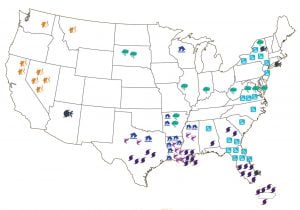Dear friends…
Last fall, I wrote about the importance of community, particularly as a community of faith (see the October edition of the Beach Breeze). Of course, we may agree that a community of faith is not limited to those who attend worship at PB UMC. Our extended community of faith surely includes fellow United Methodists in our District and Annual Conference and those in our worldwide denomination.
“Together we have an opportunity to become more than we are on our own. We are made more perfect in these relationships, and are connected in divine love. I believe that when we spend our time and energy nurturing these relationships, a part of what we are doing is nurturing and building our relationship with God.”
And we might also understand our community of faith in a broader way. What if we were to consider everyone in our community part of this connection? What if we were to broaden our understanding of the Divine to a truly infinite presence? What if God isn’t limited to our boxed-in preconceptions or even our personal experiences, but instead included so many more ideas?
If we were to try to understand God in this way, we might have greater connection with persons of other faith traditions, persons who are spiritual but not religious, persons who are agnostic, persons who have been hurt by the church or people of faith.
I think it all comes down to relationships. I think it all comes down to connection.
In the early Methodist movement, John Wesley saw the growing number of people as a “connextion” of the body of Christ. In joining together, more work could be done; more lives could be touched; more relationships could be built; more transformation could be experienced.
 I believe this is the case today. Indeed, this is why our denomination is structured in the way that it is. By way of example, the United Methodist Committee on Relief (UMCOR) granted more than $21 million in the U.S. alone in relief toward:
I believe this is the case today. Indeed, this is why our denomination is structured in the way that it is. By way of example, the United Methodist Committee on Relief (UMCOR) granted more than $21 million in the U.S. alone in relief toward:
- hurricanes Harvey, Irma, and Maria;
- tornadoes in Texas, Louisiana, and Mississippi;
- wildfires in several states in the Western Jurisdiction;
- flooding in Arkansas, Texas, Michigan, and Mississippi;
- and additional relief projects around the country.
This incredible work is only made possible through our connectional commitment to serving others. And this large-scale example can help us see ways we are successfully connectional in our local community. Local businesses, non-profits, schools and universities, municipal entities, and volunteers join with PB UMC to serve thousands of people each year. This is divine work made possible through connection?
But I would suggest that there is more to be done. We still have opportunities to build connections with our neighbors here in Pacific Beach and in the communities where our members live. How do you spend time building connection in your community? How do you nurture relationships with the people who live on your street, the people you see in grocery stores, the people you see on the roads and freeways, the people at nearby schools? How do you nurture the relationships you have established with your faith community at PB UMC through worship, through potlucks and picnics, through music or learning events? And how do you bridge – or connect – all of these together to create an interwoven connection like the one Wesley envisioned?
I believe that building connection is something we are called to do, and something we’re already good at doing as United Methodists. Let’s get even better at it!

Pastor Bob
